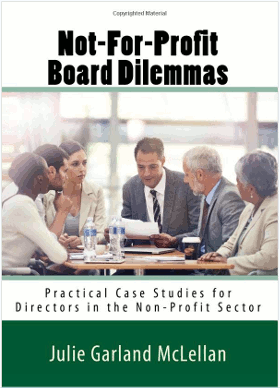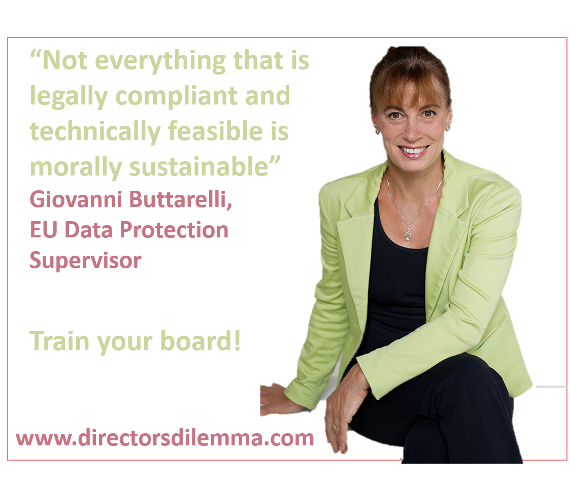|
|
|
|
|
|
|
|
|
Dear reader,
Welcome to the February 2019 edition of The Director’s Dilemma.
I write these dilemmas based on real events that have occurred during my twenty years’ experience serving on and consulting to boards. The reputation damage and career impacts of a board gone awry can be severe. I work with directors to help them succeed and avoid becoming front page news, banned or fined. I do this by diagnosing board processes and procedures to identify latent problems, and guiding clients to address threats before they eventuate.
To read this email in a browser, go to www.mclellan.com.au/newsletter.html and click on 'read the latest issue'.
This month our case study protagonist faces a dilemma caused by board disunity and breeches of confidentiality. I hope you enjoy thinking about the governance and strategic implications of the latest dilemma:
 Henry chairs a not-for-profit company and usually finds it a gratifying experience. Recently the company has been through hard times as the government ceased funding some activities although the community still needs them. Henry chairs a not-for-profit company and usually finds it a gratifying experience. Recently the company has been through hard times as the government ceased funding some activities although the community still needs them.
Henry and his board worked hard to develop new income streams to support continuing the company’s work. They achieved some success, but not enough to avoid having to discontinue some work and reduce headcount. All directors regretted having to make long-serving and loyal staff redundant. However, they had to find a balance of activity and income that would be sustainable; this was a necessary part of the strategy for success.
One director was vehemently opposed to the changes, preferring to run at a loss, eat into reserves, and hope for a change of heart from the government. When it was clear that this director would never agree, Henry took the matter to a vote and the cuts were approved with only one dissenter. Henry reminded the board that board decisions were ‘board decisions’ and all agreed that they would publicly support the approved course of action.
Since then the CEO has complained to Henry that the dissenting director has spoken to staff suggesting they ‘lawyer up’ to protect themselves from redundancies, oppose the closure of the unsustainable activities, and start a Facebook campaign to ‘shame the government into resuming funding’. Henry has also heard from friends that his dissenter is complaining publicly about the decision even though board policy is that the CEO or Chair are the two authorised spokesmen.
How can Henry handle this dissident director?
|
|
|
|
Jane's Answer
 As Chair, it is Henry’s responsibility to address this issue, and with urgency – he mustn’t let it fester! He needs to arrange to meet with the dissident director privately, as soon as practicable. As Chair, it is Henry’s responsibility to address this issue, and with urgency – he mustn’t let it fester! He needs to arrange to meet with the dissident director privately, as soon as practicable.
Before the meeting, Henry may need to reacquaint himself with the details of the process regarding resignation and a director not being put up for re-election and he may also wish to seek advice on this. Henry needs to be mindful that he cannot allow the decision of the board to be relitigated – this would serve not only to undermine the decision-making process but also the other board members’ confidence in it (and in Henry as a leader).
Henry’s discussion with the dissident director needs to be frank; the director has gone back on their commitment to publicly support board decisions. Their renegade behaviour has created a significant reputational risk, which is increasing by the day, and this cannot continue.
Henry needs to make it clear that, if the director refuses to accept the decision of the board and publicly support it, it is untenable that they remain on the board. If they do not volunteer, Henry needs to convince them that resigning or not seeking re-election is the appropriate course of action. If, on the other hand, the director commits to supporting all board decisions and remains, they will need to work to regain the trust of the other board members.
Once a final outcome has been agreed, Henry needs to advise the other board members and CEO.
Jane Davel is a non-executive director and consultant. She is based in Auckland, New Zealand.
|
|
|
|
Julie's Answer
 In theory, once a decision is taken, it is a decision of the board and must be supported by all directors regardless of how strongly they opposed it during the decision-making process. In practice, directors with a deeply held conviction about what is ‘right’ will find it hard to let go of that and give their support to the implementation of decisions they disagreed with. In theory, once a decision is taken, it is a decision of the board and must be supported by all directors regardless of how strongly they opposed it during the decision-making process. In practice, directors with a deeply held conviction about what is ‘right’ will find it hard to let go of that and give their support to the implementation of decisions they disagreed with.
Hard does not mean impossible!
Henry, or a professional mediator, should talk with the director and verify the CEO’s statement. They can then explore with the director the likely costs of their public dissent to the organisation; harming reputation, government relationships, and staff productivity.
This will give Henry a clear understanding of whether the dissenter will come back into the board team or remain in opposition to it, and by extension, to the smooth running of the organisation. Hopefully the director will care enough about the organisation to resume good board behaviour.
If board unity cannot be re-established the dissenter should be asked to resign.
Henry must be prepared to take the matter to the members and ask for a vote to remove the director if resignation is refused. He cannot run a board with members who actively oppose implementation of approved strategy. Although the process for director removal is rarely used it is there for situations like this. The value of board unity is far higher than the cost of an extra general meeting and the public embarrassment of taking a board disagreement to the members.
Julie Garland McLellan is a non-executive director and board consultant based in Sydney, Australia.
|
|
|
|
Lauren's Answer
 A director who publicly voices disagreement with a decision that the board made and encourages employees to take a legal stand against the company is not a director that should remain on the board. It sounds like Henry did a good job of reminding the board that their obligation was to support the board decision but that the rogue director did not follow his direction. My advice to Henry would be to take the following actions: A director who publicly voices disagreement with a decision that the board made and encourages employees to take a legal stand against the company is not a director that should remain on the board. It sounds like Henry did a good job of reminding the board that their obligation was to support the board decision but that the rogue director did not follow his direction. My advice to Henry would be to take the following actions:
-
Speak with the General Counsel or outside counsel about legal warnings or action that should be taken. By speaking negatively about actions being taken by the board, the rogue director is violating his/her duty of care and duty of loyalty.
-
Speak with each member of the rest of the board about the rogue director and convince them that the she/he cannot remain on the board.
-
Ask the rogue director for his/her resignation and tell him/her that if there is not a voluntary resignation then the board is prepared to officially vote him/her off the board, assuming the bylaws allow for such an action.
-
Work with the CEO to craft a message to employees and do damage control to mitigate any issues caused by the rogue director.
Lively discussion and dissenting views should be a part of any board decision. However, when the board has made its decision, all directors must support that decision publicly. Henry needs to proactively manage this situation in the best interest of the company.
Lauren Smith is President of the Florida Chapter of NACD and a director on five boards. She is based in Miami, Florida, USA.
|
|
|
|
Book review - Not-For-Profit Board Dilemmas
 If you enjoyed this month’s dilemma you will greatly enjoy and benefit from the Not-For-Profit Board Dilemmas book. “All Directors are leaders, whether in the private, public or not-for-profit space. All organisations look to their boards for direction, mentoring, support and advice - adding tremendous value to the professionalism of organisations. NFP directors are in a unique position. They are advocates of their cause and many also contribute to their organisations on a volunteer basis outside their role as a board member. What is vital though, is that these directors understand their legal obligations as
custodians of their organisation. I congratulate Julie Garland McLellan on successfully highlighting the importance for directors, specifically NFP directors, to practice good governance across all aspects of their organisation in her series of relatable and honest case studies.” If you enjoyed this month’s dilemma you will greatly enjoy and benefit from the Not-For-Profit Board Dilemmas book. “All Directors are leaders, whether in the private, public or not-for-profit space. All organisations look to their boards for direction, mentoring, support and advice - adding tremendous value to the professionalism of organisations. NFP directors are in a unique position. They are advocates of their cause and many also contribute to their organisations on a volunteer basis outside their role as a board member. What is vital though, is that these directors understand their legal obligations as
custodians of their organisation. I congratulate Julie Garland McLellan on successfully highlighting the importance for directors, specifically NFP directors, to practice good governance across all aspects of their organisation in her series of relatable and honest case studies.”
John Brogden, Former MD & CEO of the Australian Institute of Company Directors, Chairman of Lifeline Australia, UrbanGrowth NSW and Furlough House Retirement Village.
Julie's news – In December and January
 I had a busy end to the calendar year with an inhouse workshop for a large multinational company on Presenting to Boards and Developing ‘Executive Presence’. We all enjoyed exploring how better presentations can build your credibility whether in the boardroom or in a small one-on-one meeting. I am hoping to repeat this training for other clients as well as the original one. I had a busy end to the calendar year with an inhouse workshop for a large multinational company on Presenting to Boards and Developing ‘Executive Presence’. We all enjoyed exploring how better presentations can build your credibility whether in the boardroom or in a small one-on-one meeting. I am hoping to repeat this training for other clients as well as the original one.
I then had the pleasure of co-hosting an executive leadership workshop with Phil Preston for another of my long-standing clients. Other than my ‘Presenting to Boards’ I rarely work with executives and enjoyed the energy and enthusiasm.
Then there were the final board meetings of the year for each of my own boards, which, as always, required a great deal of independent thinking and reading around the topics in the papers. These were followed by appropriate end of year celebrations!
A director development workshop and board strategy workshop for two new clients kept me busy and excited by the possibilities facing both boards to make a huge positive impact in their respective sectors.
A relaxed family Christmas was set to be followed by a productive month of writing and preparing for 2019. Alas! It was not to be. I somehow injured my back in routine training and had to spend several days in hospital followed by a few weeks of careful rest. The prognosis is a full recovery and I’m looking forward to getting back to my normal busy life!
I am always keen to work more and will be delighted to hear from you if you would like to arrange a board strategy workshop, education session, or board performance review! Just call me on the number below or reply to this email for a discussion of how I might help your board.
Inspirational quote for February - This month my favourite quote is:

Giovanni Buttarelli made this statement about the collection, storage and use of personal data. For directors it can apply to every aspect of the dilemmas we face in governing our companies. Understanding how our actions and decisions will be perceived and remaining ahead of legislation rather than relying on precise legal definitions and reluctantly complying with legislation is a standard we can aspire to!
A note on names - A few readers have asked me where I find the names for the protagonists in each case study; I 'borrow' them from people I meet for things that I read. Henry is an old English name that is said to mean “rules his household”. Our protagonist will need to return to a situation where he is seen to lead (if not rule) his board with the support of all the directors.
This newsletter - If you have any ideas for improving the newsletter please let me know. If you are reading a forwarded copy please visit my website and sign up for your own subscription.
Suggestions for dilemmas - Thank you to all the readers who have suggested dilemmas. They are greatly appreciated. I will answer them all eventually. I could not write this newsletter without your help and without the generous help of all the experts who respond each month to the case studies.
Be a contributor - If you would like to attempt a response to the dilemmas for publication you will be most welcome. Simply reply to this email and let me know.
Let's connect - I use LinkedIn to share information about boards and directorship with my friends and acquaintances. If you use LinkedIn and we are not yet connected I will welcome a connection from you. You can find me at linkedin.com/in/juliegarlandmclellan.
Let me help you - If you would like me to speak to or train your board, staff, audience and/or group please contact me at julie@mclellan.com.au.
Farewell until the next issue (due 1 March 2019). I look forward to greeting you again then. In the interim I hope you will enjoy health, happiness and hard work as well as a lovely holiday.
Enjoy governing your corporations; we are privileged to do what we do!
Best regards,
Julie
Photo Credits: Personal images in this newsletter are provided courtesy of the contributors, course attendees and conference participants. Main photo courtesy of ShutterStock.com
Disclaimer:
The opinions expressed above are general in nature and are designed to help you to develop your judgement as a director. They are not a definitive legal ruling and do not constitute legal advice. Names and some circumstances in the case study have been changed to ensure anonymity. Contributors to this newsletter comment in the context of their own jurisdiction; readers should check their local laws and regulations as they may be very different.
Privacy: I am privileged to have your contact details and keep them as safely as possible. I will alert you if they are ever accessed by any unauthorised person (the technical staff at ayuda help with publishing and issuing the Director's Dilemma and have access so they can send the newsletters to you). I do not sell your details to anyone; they are kept only for the intended purpose - sending you this newsletter and helping to build the judgement of company directors by providing a safe way to consider potential responses to real life events.
|
|
|
|
|
|
|
|
|
|
|
|
|
 Henry chairs a not-for-profit company and usually finds it a gratifying experience. Recently the company has been through hard times as the government ceased funding some activities although the community still needs them.
Henry chairs a not-for-profit company and usually finds it a gratifying experience. Recently the company has been through hard times as the government ceased funding some activities although the community still needs them.
 As Chair, it is Henry’s responsibility to address this issue, and with urgency – he mustn’t let it fester! He needs to arrange to meet with the dissident director privately, as soon as practicable.
As Chair, it is Henry’s responsibility to address this issue, and with urgency – he mustn’t let it fester! He needs to arrange to meet with the dissident director privately, as soon as practicable. In theory, once a decision is taken, it is a decision of the board and must be supported by all directors regardless of how strongly they opposed it during the decision-making process. In practice, directors with a deeply held conviction about what is ‘right’ will find it hard to let go of that and give their support to the implementation of decisions they disagreed with.
In theory, once a decision is taken, it is a decision of the board and must be supported by all directors regardless of how strongly they opposed it during the decision-making process. In practice, directors with a deeply held conviction about what is ‘right’ will find it hard to let go of that and give their support to the implementation of decisions they disagreed with. A director who publicly voices disagreement with a decision that the board made and encourages employees to take a legal stand against the company is not a director that should remain on the board. It sounds like Henry did a good job of reminding the board that their obligation was to support the board decision but that the rogue director did not follow his direction. My advice to Henry would be to take the following actions:
A director who publicly voices disagreement with a decision that the board made and encourages employees to take a legal stand against the company is not a director that should remain on the board. It sounds like Henry did a good job of reminding the board that their obligation was to support the board decision but that the rogue director did not follow his direction. My advice to Henry would be to take the following actions:
 I had a busy end to the calendar year with an inhouse workshop for a large multinational company on Presenting to Boards and Developing ‘Executive Presence’. We all enjoyed exploring how better presentations can build your credibility whether in the boardroom or in a small one-on-one meeting. I am hoping to repeat this training for other clients as well as the original one.
I had a busy end to the calendar year with an inhouse workshop for a large multinational company on Presenting to Boards and Developing ‘Executive Presence’. We all enjoyed exploring how better presentations can build your credibility whether in the boardroom or in a small one-on-one meeting. I am hoping to repeat this training for other clients as well as the original one.
